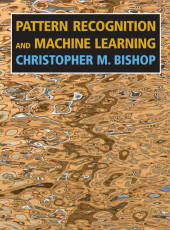 Neuerscheinungen 2016Stand: 2020-02-01 |
Schnellsuche
ISBN/Stichwort/Autor
|
Herderstraße 10
10625 Berlin
Tel.: 030 315 714 16
Fax 030 315 714 14
info@buchspektrum.de |

Christopher M. Bishop
Pattern Recognition and Machine Learning
Softcover reprint of the original 1st ed. 2006. 2016. XX, 738 S. 254 mm
Verlag/Jahr: SPRINGER, BERLIN; SPRINGER NEW YORK 2016
ISBN: 1-493-93843-6 (1493938436)
Neue ISBN: 978-1-493-93843-8 (9781493938438)
Preis und Lieferzeit: Bitte klicken
This is the first textbook on pattern recognition to present the Bayesian viewpoint. It presents approximate inference algorithms that permit fast approximate answers in situations where exact answers are not feasible, and it uses graphical models to describe probability distributions.
This is the first textbook on pattern recognition to present the Bayesian viewpoint. The book presents approximate inference algorithms that permit fast approximate answers in situations where exact answers are not feasible. It uses graphical models to describe probability distributions when no other books apply graphical models to machine learning. No previous knowledge of pattern recognition or machine learning concepts is assumed. Familiarity with multivariate calculus and basic linear algebra is required, and some experience in the use of probabilities would be helpful though not essential as the book includes a self-contained introduction to basic probability theory.
Probability Distributions.- Linear Models for Regression.- Linear Models for Classification.- Neural Networks.- Kernel Methods.- Sparse Kernel Machines.- Graphical Models.- Mixture Models and EM.- Approximate Inference.- Sampling Methods.- Continuous Latent Variables.- Sequential Data.- Combining Models.
Chris Bishop is a Microsoft Distinguished Scientist and the Laboratory Director at Microsoft Research Cambridge. He is also Professor of Computer Science at the University of Edinburgh, and a Fellow of Darwin College, Cambridge. In 2004, he was elected Fellow of the Royal Academy of Engineering, and in 2007 he was elected Fellow of the Royal Society of Edinburgh.
Chris obtained a BA in Physics from Oxford, and a PhD in Theoretical Physics from the University of Edinburgh, with a thesis on quantum field theory. He then joined Culham Laboratory where he worked on the theory of magnetically confined plasmas as part of the European controlled fusion programme.


